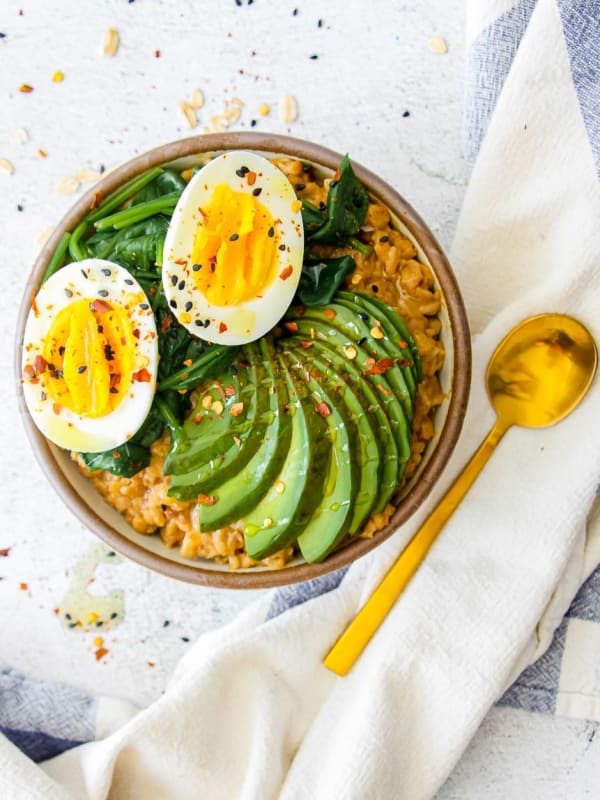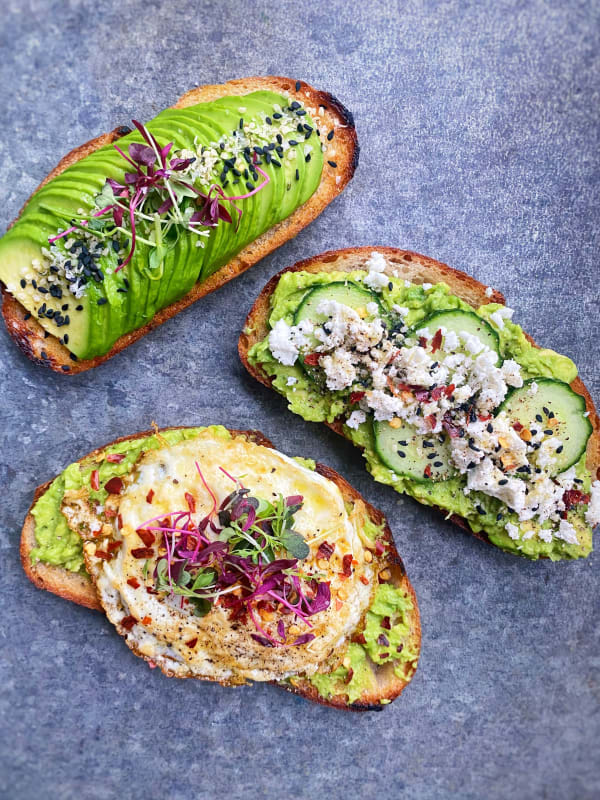Popular Conditions & Diets

Imagine for a moment that you had never encountered an avocado.
Imagine I told you that there existed a pear-shaped fruit very high in fat, covered in scaly skin like a crocodile, filled with lusciously creamy, eye-poppingly chartreuse flesh and that it was one of the healthiest things on the entire planet to eat.
Would you believe me?
This emerald of a fruit, often mistaken for a vegetable, is indeed very real and an absolute nutritional titan with a fascinating history spanning continents and cultures.
Whether you smash it on toast, blend it into a smoothie, or slice it onto a salad, the avocado is more than a food; it's a cultural icon with deep roots and profound health benefits.

Historical traces of avocado cultivation go back at least 10,000 years in southern Mexico. Archaeological evidence suggests that Mesoamerican peoples like the Aztecs, Olmecs, and Mayans were some of the first people to cultivate and consume avocados.

When discussing healthy fats, it's almost unthinkable not to mention avocados. The high oleic acid content puts them in the same league as olives; both fruits share the superlative monounsaturated fatty acid levels that make Mediterranean diets so heart-friendly. Avocado oil has even eclipsed olive oil for cooking in many kitchens, as it has a neutral flavour and an extremely high smoke point of almost 260 degrees Celsius.


When selecting avocados, there are several factors to consider that encompass quality, ripeness, ethics, and environmental impact:

Proper storage of avocados can significantly extend their usability and freshness:
The future of avocado consumption will depend on finding sustainable farming and trading practices that meet global demand without compromising ethics or the environment. Efforts such as water-efficient irrigation technologies, direct trade certification, and ethical sourcing may mitigate some of these impacts. As a thoughtful consumer, looking for traceability and transparency when purchasing them is imperative.
Another imperative of avocado consumption is to appreciate them. From the distance they travel to the hands that harvested them, to the astounding health benefits of eating them regularly, to their buttery texture and insanely delicious flavour profile, these marvels of nature must never be taken for granted! The miracle of the avocado is one to be respected, protected, cherished, and enjoyed.
Avocados. The Nutrition Source. (2023a, February 2). https://www.hsph.harvard.edu/nutritionsource/avocados/
Dreher, M. L., Cheng, F. W., & Ford, N. A. (2021). A comprehensive review of Hass Avocado Clinical Trials, observational studies, and Biological Mechanisms. Nutrients, 13(12), 4376. https://doi.org/10.3390/nu13124376
Flannery, N. P. (2024, February 20). Are U.S. avocado buyers financing the cartel conflict in Mexico?. Forbes. https://www.forbes.com/sites/nathanielparishflannery/2023/04/11/are-us-avocado-buyers-financing-the-cartel-conflict-in-mexico/?sh=605db0621017
Ford, N. A., Spagnuolo, P., Kraft, J., & Bauer, E. (2023). Nutritional composition of Hass Avocado Pulp. Foods, 12(13), 2516. https://doi.org/10.3390/foods12132516

It's believed that these ancient civilizations revered the avocado as a symbol of health and fertility. The Aztecs, who called the avocado "ahuacatl" (which means "testicle" in reference to the fruit's shape), incorporated it into both their diet and their medicinal practices.
By the 16th century, Spanish conquistadors became enamoured with avocados and introduced them to Europe. The avocado tree thrived in similar climates worldwide, from California to New Zealand, making the avocado the global staple we know today.
Avocados contain vitamins (beta carotene, K, C, E, and Bs) that support healthy nervous system function, prevent ageing, and keep the immune system glowing. They are generously blessed with magnesium, and a single avocado boasts even more potassium than two large bananas!
These minerals, especially, work in tandem with the fruit's amazingly high fibre content- as much as 80 per cent of the carbohydrate content is an elite mix of soluble and insoluble fibre, including pectin, cellulose, and hemicellulose. The result is a prebiotic powerhouse offering unrivalled support for the gut microbiome with the potential to effectively treat constipation.
Oleic acid is metabolized in the body to become oleoylethanolamine (OEA). This potent epigenetic signalling molecule cues our genetic machinery to burn more fats for fuel. In fact, avocados even contain small amounts of EGCG (epigallocatechin gallate), another age-reversing, DNA-activating epinutrient you may recognize as one of the compounds that put green tea on the map.
Another fascinating aspect of avocados is their ability to increase nutrient absorption from other foods. According to a study in The Journal of Nutrition, adding avocado to a salad can enhance the absorption of carotenoids - essential nutrients that help maintain eye health - from the salad by up to 1500 per cent compared to salads without avocado! Meanwhile, the fatty acids in avocados help the absorption of all fat-soluble vitamins they are paired with, namely vitamins A, D, E, and K.
It's one thing to list nutrients in a food and then talk about them. It can even be fun to speculate on how the interplay between those nutrients in their natural food-based package might support our health in ways that scientific research has yet to tease out.
Since avocados have over 100 biologically active chemical compounds, we have really only scratched the surface of how these complex components fit together and how they might work synergistically to improve our health.
However, it's another thing entirely to look at how eating avocados affects health outcomes. Fortunately, we know quite a lot about this from the gold standard of nutritional research: randomised controlled trials on humans. From there, we know that:
-Eating one avocado a day can significantly lower triglycerides, total cholesterol, and LDL, the 'bad cholesterol,' while raising HDL, the 'good cholesterol.' Perhaps even more importantly, it lowers oxidized and small-dense LDL cholesterol particles. This stunning combination of cardiometabolic effects makes avocado consumption almost unbelievably heart-healthy.
-Avocadoes balance blood sugar and make us more satisfied after meals, making us less likely to get snack cravings. People who eat avocados seem to naturally and effortlessly take in fewer calories.
-Eating them improves cognitive function, working memory, sustained attention, and problem-solving abilities in older individuals. If all of that weren't enough, avocados improve fasting glucose, insulin sensitivity, and glycated hemoglobin - all significant risk factors for diabetes risk and critical markers for monitoring the progression of the disease.
Avocados should feel slightly soft when gently pressed - but not mushy. A good quality avocado will also be uniform in texture without any dents or overly soft spots, which can indicate bruising or internal rot. The skin colour can vary from green to dark brown, depending on the variety. Hass avocados, the most common variety, turn dark green or black as they ripen. For avocados you plan to use immediately, select those that yield slightly to pressure. Choose firmer ones if you plan to use them later in the week.
Unfortunately, the lucrative nature of avocado export has attracted corruption and organized crime. Cartels in Michoacan may even control the majority of avocados flowing into North America. So, consider purchasing avocados from companies and farms that uphold fair trading standards and ethical labour practices. Fair Trade certification or similar can indicate that the avocados were produced under fair conditions that benefit the local farmers and their communities. The more traceability and transparency, the better.
As the popularity of avocados has grown, so has concern over their environmental impact. Avocado farming requires substantial water, a pressing issue in regions like California and Chile, where water resources are scarce. Additionally, the global demand for avocados has increased pressures on farming practices, sometimes resulting in deforestation and other ecological impacts. To minimize environmental impact, look for locally grown avocados (if possible) or certified organic, which can indicate a lower pesticide use and a farming process that is more likely to prioritize sustainability.
If your avocados are still hard, leave them at room temperature in a fruit basket or countertop. To speed up the ripening process, you can place them in a brown paper bag with an apple or banana emitting ethylene gas, a natural ripening agent.
Once an avocado becomes ripe, place it in the refrigerator if you are not ready to use it right away. The cold environment will slow the ripening process and can extend the avocado's freshness for several days.
To store cut avocados, sprinkle the exposed flesh with lemon or lime juice to prevent browning. Wrap it tightly in plastic wrap or place it in an airtight container and refrigerate. This method can keep the avocado fresh for about one or two days. Alternatively, you can store the cut avocado in water in an airtight container in the refrigerator for about the same duration. However, this might alter the texture slightly.
Galindo-Tovar, M. E., Arzate-Fernández, A. M., Ogata-Aguilar, N., & Landero-Torres, I. (2007). THE AVOCADO (PERSEA AMERICANA, LAURACEAE) CROP IN MESOAMERICA: 10,000 YEARS OF HISTORY. Harvard Papers in Botany, 12(2), 325–334. http://www.jstor.org/stable/41761865
Harvard T.H. Chan. (2023b, February 2). Avocados. The Nutrition Source. https://www.hsph.harvard.edu/nutritionsource/avocados/
Murray, M. T., Pizzorno, J. E., & Pizzorno, L. (2006). The Encyclopedia of Healing Foods. Time Warner International.
Review of Domestication and significance of persea americana persea americana, the avocado, in mesoamerica avocado, in mesoamerica by Amanda J. Landon. (2009). Nebraska Anthropologist , (47).
Scott, T., Rasmussen, H., Chen, O., & Johnson, E. (2017). Avocado consumption increases macular pigment density in older adults: A randomized, controlled trial. Nutrients, 9(9), 919. https://doi.org/10.3390/nu9090919
Simon, S. (2022, February 19). Mexican drug cartels are getting into the avocado and lime business. NPR. https://www.npr.org/2022/02/19/1081948884/mexican-drug-cartels-are-getting-into-the-avocado-and-lime-business
Slajerova, M., Norwitz, N., DeLauer, T., & Kashid, R. (2021). The new Mediterranean diet cookbook: The optimal keto-friendly diet that Burns Fat, promotes longevity, and prevents chronic disease. Fair Winds Press, an imprint of The Quarto Group.
The problem with avocados. Food Empowerment Project. (n.d.). https://foodispower.org/our-food-choices/the-problem-with-avocados/
Times, T. (2023, October 22). Avocado’s rich history: From Aztecs to modern cuisine. The Tico Times | Costa Rica News | Travel | Real Estate. https://ticotimes.net/2023/10/22/avocado-the-aphrodisiacal-pear
Unlu, N. Z., Bohn, T., Clinton, S. K., & Schwartz, S. J. (2005). Carotenoid absorption from salad and salsa by humans is enhanced by the addition of avocado or avocado oil. The Journal of Nutrition, 135(3), 431–436. https://doi.org/10.1093/jn/135.3.431
Wang, L., Bordi, P. L., Fleming, J. A., Hill, A. M., & Kris‐Etherton, P. M. (2015). Effect of a moderate fat diet with and without avocados on lipoprotein particle number, size and subclasses in overweight and obese adults: A randomized, controlled trial. Journal of the American Heart Association, 4(1). https://doi.org/10.1161/jaha.114.001355
Wien, M., Haddad, E., Oda, K., & Sabaté, J. (2013). A randomized 3x3 crossover study to evaluate the effect of Hass avocado intake on post-ingestive satiety, glucose and insulin levels, and subsequent energy intake in overweight adults. Nutrition Journal, 12(1). https://doi.org/10.1186/1475-2891-12-155
Zentmyer, G., Schieber, E., & Popenoe, W. (1987). Review of Early history of the avocado during the time of the conquistadores.